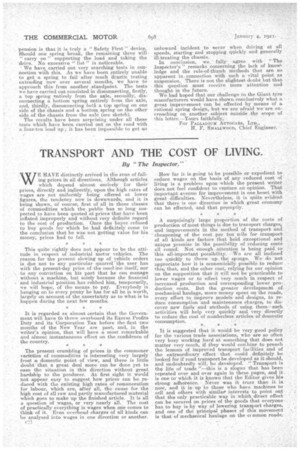TRANSPORT AND THE COST OF LIVING.
Page 24

If you've noticed an error in this article please click here to report it so we can fix it.
By it The Inspector.
E HAVE distinctly arrived in the zone of 'fail ing prices in all directions. Although articles
which depend almost entirely for their prices, directly and irkdirectly, upon the high rates of wages are not uniformly being' offered at lower figures, the tendency now is downwards, and it is being shown, of course, first of all in. those classes of commodities which the . public has so long suspected to have been quoted at prices that have been inflated improperly and without very definite regard to the cost of production. Once the buyer refused to buy goods for which he had defieitely come to the conclusion that he was not -getting value for his money, prices had to fall.
This quite rightly does not appear to be the attitude in respect of industrial motor vehicles. The reason for the present slowing up of vehicle orders is due not to any particular quarrel the user has with the present-day price of the macline itself; nor to any conviction on his part that he can manage without. a machine, but solely because the financial ▪ and industrial pesition has robbed him, temporarily,
we will hope, of the means to pay. Everybody is hanging on to every penny he has for all he is worth, largely on account of the uncertainty as to what is to happen during the next few months. •
It is regarded as almost certain that the Government will have fo throw overboard its Excess Profits Duty and its Corporation Tax before the -first two months of the New Year are past, and, in the writer's opinion, that will have a Most remarkable and almost instantaneous effect on the confidence of the country.
The present crumbling of prices in the commoner varitties of commodities is interesting very largely front a domestic point of view, and there is little doubt that a great deal more can be done yet to ease the situation in this direction without great hardship to the -producer. At first sight it would not appear, easy to suggest how prices can he reduced , with the existing high rates of remuneration for labour, which are, after' all, the cause for the high cost of raw and partly manufactured material which goes to make up the finished article. It is all a question of wages, or very nearly all. The cost of practically everything is wages when one comes to think of it. -Even overhead charges of all kinds can be analysed into wages in one direction or another.
r^1 How far it is going to be possible or expedient to reduce wages on :the basis of any reduced cast of living is a problem uponwhich the present writer does not feel confident to venture' an opinion. That important avenue for improvement is one beset with great -difficulties. Nevertheless, it is quite evident that there is one direction in which great economy
can be effected, and that promptly.
A surprisingly large proportion of the costs of production of most things is due to transport chargea, and improvements in the method of transport and ' cheapening of the cost per ton mile for transport of all kinds are factors that hold exceptional and unique promise in 'the possibility of .reducing costs all round: Not enough attention is being paid to 'this all-important possibility. We are all inclined too quickly to throw up the sponge. We de not appreciate how it is economicIlly possible to reduce this, that, and the other cost, relying for our opinion on the supposition that it will not be practicable. to lower wages or to effect very mulch in respect . of increased .production and corresponding -lower production costs, But the greater developmeat of mechanical haulage, more money spent on the roads, every effort to improve models' and . designs, to re-duce consumption 'and maintenance charges, to discover new fuels 'and ntethods of using them—such activities. will help' very quickly and verydirectly to reduce the cost of numberless articles of domestic consumption.
It is suggested that it would. be very good policy for the various trade associations, who are so often very busy working hard at something that does not matter very much, if they would combine to preach the lesson's of improVed transport facilities and of the extraordinary effect that could definitely be looked for if road transport be developed as it should, and undoubtedly will, be developed. "Transport. is the life of trade "=this is a slogan that has been repeated over and over again in these pages, and it is one to' which it is known that the Editor gives his strong adherenee. Never was it truer than it is now, and it is up to those who have machines to sell and others with similar' interests to point out • that the only practicable way in which direct effect can be secured on prices of the goods that everyone • has to buy is by way of lowering transport charges, and one of the principal phases of this movement is that of mechanical haulage on the crrnmori roads:




























